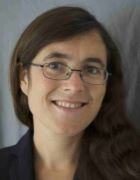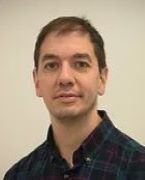
|
|
|
Conférenciers invités
Anne-Laure Boulesteix (Ludwig-Maximilians University, Munich - Germany)
Anne-Laure Boulesteix obtained a diploma in engineering from the Ecole Centrale Paris, a diploma in mathematics from the University of Stuttgart (2001) and a PhD in statistics (2005) from the Ludwig Maximilian University (LMU) of Munich. After a postdoc phase in medical statistics, she joined the Medical School of the University of Munich as a junior professor (2009) and professor (2012). She is working at the interface between biostatistics, machine learning and medicine with a particular focus on metascience and evaluation of methods. She is a steering committee member of the STRATOS initiative, founding member of the LMU Open Science Center and president-elect of the German region of the International Biometric Society. Véronique Eparvier (CNRS-ICSN, Gif-sur-Yvette - France)
Véronique Eparvier is graduated with two Master’s degrees: Sciences of Agro-resources (National Polytechnic Institute of Toulouse), and Anthropology (Laboratory of Human Ecology and Anthropology, Aix-Marseille III University) and since 2005 with a PhD, specialty “Chemistry of Natural Substances” from the National Museum of Natural History. In 2006, she joined the CNRS-Guyane as a Research Engineer. She joined the ICSN “Institut de Chimie des Substances Naturelles” in 2011 where she participates in the development of research programs on symbiotic microorganisms and developed a strain library. She obtained her HDR in October 2013 and she is CNRS research director since 2020; she leads the Functional Chemistry-Chemical Ecology team, and she is deputy coordonnator of “Natural Products and Medicinal Chemistry” department of ICSN. She is since 2021 a member of the CNRS national committee, section 16 CoCNRS. The team’s research goals concern the broad field of natural substances chemistry. In this context, the team interest is to study the interactions between microorganisms and plants and microorganisms and insects, in order to discover specialized metabolites with pharmacological and/or agrochemical interest but also to understand their ecological role. For this purpose different methodological tools such as chemical ecology and functional chemo-diversity are used and developed. The aim of this research is to carry out integrated approaches for the study and valorization of specialized metabolites from original resources of natural substances such as symbiotic microorganisms. Oscar Millet (Precision Medicine and Metabolism Lab, Bizkaia - Spain)
I obtained a Degree in Chemistry (Univ. Ramon Llull, 1994) and Chemical Engineering (IQS, 1995). After obtaining a PhD in Organic Chemistry (University of Barcelona, 1999) I joined the group of Lewis Kay in Toronto for a post-doctoral stay (University of Toronto, 2000-2004). I was then recipient of a Ramon y Cajal reincorporation contract at the Parc Científic de Barcelona (2004-2006) and I currently am the group leader of the Precision Medicine and Metabolism laboratory of CIC bioGUNE. My research line focuses on the use of nuclear magnetic resonance (NMR) to the study of biologically relevant proteins and enzymes, paying special attention to the delicate balance existing between protein stability and dynamics. Such knowledge is applied for the development of new compounds with therapeutic activity in the field of rare diseases, and it has developed into the creation of a spin-off company, ATLAS Molecular Pharma. I have found a new pharmacological chaperone for the treatment of congenital erythropoietic porphyria, which is a repurposed drug and it has obtained the Orphan Drug Designation status. Additionally, I am also interested in the NMR-based metabolomics of biofluids for the diagnose of rare and prevalent diseases. I have published more than 100 papers with a total number of citations (1998-2017) of 3500 and an h-index of 28. I have been awarded the prize of the Real Sociedad Española de Química (2004), the Spanish NMR group prize (2020), the Elhyyar-Goldschmidt award of the German Chemical Society (2022) and nominated Academic of the Academy of Medical Sciences of the Basque Country (2016). I am currently the president of the Spanish Chemical Biology group. Georg Pohnert (Friedrich Schiller University Jena, Erfurt - Germany) The current research of the Pohnert-group takes a highly interdisciplinary approach to understand the nature and role of chemical signals that shape complex communities in the aquatic environment. A tool of fundamental importance is comparative community metabolomics, to first identify the signals present in natural interactions. Isolation, spectroscopy and organic synthesis of natural products are combined with transcriptomics, biochemistry, and ecology, with the ultimate goal to understand the basis of community interactions in plankton and biofilm communities. Georg Pohnert, studied Chemistry at the University of Karlsruhe. He then moved to the University of Bonn and the University of Washington where he pursued his doctoral studies in the Group of Prof. W. Boland. In 1997 he joined the groups of Prof. Bruce Ganem and Prof. David B. Wilson at the Cornell University in Ithaca as a postdoc working on the biochemical and biophysical characterisation of E. coli receptors. He was then appointed to a group leader position at the Max-Planck-Institute for Chemical Ecology in Jena, Germany where he started his independent research carrier on algal defence reactions. In 2005, he joined the Institute of Chemical Sciences and Engineering of the Ecole Polytechnique Fédérale de Lausanne, Switzerland as assistant professor. A Lichtenberg Professorship was awarded to him by the Volkswagen Foundation. This brought him to the Friedrich Schiller University where he holds a chair in Instrumental Analytics. Since 2015 Georg Pohnert is has been appointed as Max-Planck-Fellow at the Max-Planck-Institute for Chemical Ecology where he heads a research team focused on the chemical regulation of plankton population dynamics. Georg Pohnert currently serves as vice president for research at the Friedrich Schiller University |




